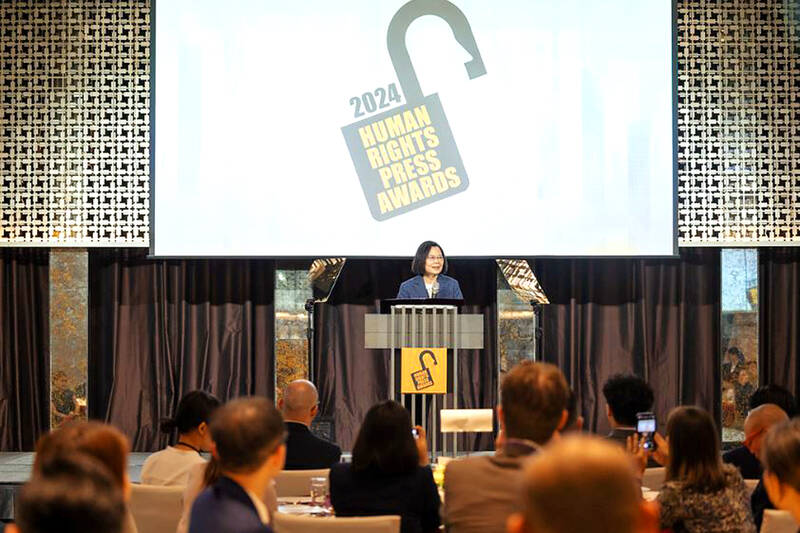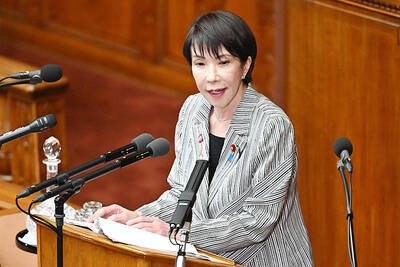The Human Rights Press Awards for Asia yesterday hosted its annual ceremony in Taiwan for the first time, celebrating journalism and human rights in a nation ranked best in Asia for press freedom.
Taiwan boasts freedom of the press and has become an important hub for international media, being home to 176 correspondents from 86 media outlets from 22 countries as of last month, President Tsai Ing-wen (蔡英文) said at the event in Taipei.
However, authoritarian regimes are constantly attempting to influence the nation’s media environment and democracy, and polarize Taiwanese society through disinformation campaigns and propaganda, Tsai said.

Photo: Screen grab from the Presidential Office’s Flickr page
It takes all sectors of society to act together to combat disinformation with timely and transparent clarification, research on authoritarian information manipulation and media literacy lessons, she said.
“Taiwan will continue to stand up for democracy, freedom and human rights,” she said.
Taiwan Foreign Correspondents’ Club president Thompson Chau (周浩霖) called on the government to “remain committed to press freedom, provide more access and ease regulations on foreign media workers.”
The winners and runners-up this year were announced on Thursday last week — to mark World Press Freedom Day the following day.
The organizers — Human Rights Watch, the Walter Cronkite School of Journalism and Mass Communication at Arizona State University, the Reynolds Center for Business Journalism, and the foreign correspondents’ clubs in Taiwan and Thailand — present the awards to “increase respect for people’s basic rights and to focus attention on threats to those freedoms.”
The awards were given in seven categories: Investigative Writing (English), Investigative Writing (Chinese), Photography, Multimedia, Documentary Video, Podcast and Newsroom in Exile, with the final two being new additions this year.
Winners included the Guardian , which earned the Investigative Writing (English) award for its reporting on alleged trafficking of workers at Amazon.com warehouses in Saudi Arabia; and Singapore-based Initium Media, which won the Chinese-
language award; and al-Jazeera, which won in the Multimedia category for its “If I die, I die: Pakistan’s death-trap route to Europe” report.
Zan Times and Frontier Myanmar — which was also honored in the Podcast category — won in the Newsroom in Exile category for their “Despair is settling in: Female suicides on rise in Taliban’s Afghanistan” and “Religious minorities persecuted in Myanmar” reports.
In the Photography category, Agence France-Presse won for its images of women fighting Myanmar’s junta.
In the Documentary Video category, BBC Chinese and Deutsche Welle were recognized for their films on anti-extradition bill protesters in Hong Kong and an elite police unit in Bangladesh.
“In an era in which rising authoritarianism generates autocratic leaders and mass disinformation, the role of journalists in exposing the truth is more critical than ever,” Human Rights Watch executive director Tirana Hassan said.
Many winners “are examples of brave journalism from Afghanistan, Hong Kong and Myanmar, places where reporting has become increasingly difficult and dangerous,” Chau said, adding that “Taiwan is an extraordinary place for a growing number of Asia-focused correspondents to live and work.”

The Central Weather Administration (CWA) yesterday said it expected to issue a sea warning for Typhoon Fung-Wong tomorrow, which it said would possibly make landfall near central Taiwan. As of 2am yesterday, Fung-Wong was about 1,760km southeast of Oluanpi (鵝鑾鼻), Taiwan’s southernmost point, moving west-northwest at 26kph. It is forecast to reach Luzon in the northern Philippines by tomorrow, the CWA said. After entering the South China Sea, Typhoon Fung-Wong is likely to turn northward toward Taiwan, CWA forecaster Chang Chun-yao (張峻堯) said, adding that it would likely make landfall near central Taiwan. The CWA expects to issue a land

Taiwan’s exports soared to an all-time high of US$61.8 billion last month, surging 49.7 percent from a year earlier, as the global frenzy for artificial intelligence (AI) applications and new consumer electronics powered shipments of high-tech goods, the Ministry of Finance said yesterday. It was the first time exports had exceeded the US$60 billion mark, fueled by the global boom in AI development that has significantly boosted Taiwanese companies across the international supply chain, Department of Statistics Director-General Beatrice Tsai (蔡美娜) told a media briefing. “There is a consensus among major AI players that the upcycle is still in its early stage,”

The Central Weather Administration (CWA) yesterday said it is expected to issue a sea warning for Typhoon Fung-wong this afternoon and a land warning tomorrow. As of 1pm, the storm was about 1,070km southeast of Oluanpi (鵝鑾鼻), Taiwan’s southernmost point, and was moving west-northwest at 28 to 32kph, according to CWA data. The storm had a radius of 250km, with maximum sustained winds of 173kph and gusts reaching 209kph, the CWA added. The storm is forecast to pass near Luzon in the Philippines before entering the South China Sea and potentially turning northward toward Taiwan, the CWA said. CWA forecaster Chang Chun-yao (張峻堯) said

Japanese Prime Minister Sanae Takaichi yesterday said that China using armed force against Taiwan could constitute a "survival-threatening situation" for Japan, allowing the country to mobilize the Japanese armed forces under its security laws. Takaichi made the remarks during a parliamentary session while responding to a question about whether a "Taiwan contingency" involving a Chinese naval blockade would qualify as a "survival-threatening situation" for Japan, according to a report by Japan’s Asahi Shimbun. "If warships are used and other armed actions are involved, I believe this could constitute a survival-threatening situation," Takaichi was quoted as saying in the report. Under Japan’s security legislation,